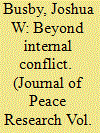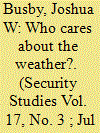|
|
|
Sort Order |
|
|
|
Items / Page
|
|
|
|
|
|
|
| Srl | Item |
| 1 |
ID:
178656


|
|
|
|
|
| Summary/Abstract |
The field of climate and security has matured over the past 15 years, moving from the margins of academic research and policy discussion to become a more prominent concern for the international community. The practice of climate and security has a broad set of concerns extending beyond climate change and armed conflict. Different national governments, international organizations, and forums have sought to mainstream climate security concerns emphasizing a variety of challenges, including the risks to military bases, existential risks to low-lying island countries, resource competition, humanitarian emergencies, shocks to food security, migration, transboundary water management, and the risks of unintended consequences from climate policies. Despite greater awareness of these risks, the field still lacks good insights about what to do with these concerns, particularly in ‘fragile’ states with low capacity and exclusive political institutions.
|
|
|
|
|
|
|
|
|
|
|
|
|
|
|
|
| 2 |
ID:
120047


|
|
|
|
|
| Publication |
2013.
|
| Summary/Abstract |
Many experts argue that climate change will exacerbate the severity and number of extreme weather events. Such climate-related hazards will be important security concerns and sources of vulnerability in the future regardless of whether they contribute to conflict. This will be particularly true where these hazards put large numbers of people at risk of death, requiring the diversion of either domestic or foreign military assets to provide humanitarian relief. Vulnerability to extreme weather, however, is only partially a function of physical exposure. Poor, marginalized communities that lack access to infrastructure and services, that have minimal education and poor health care, and that exist in countries with poor governance are likely to be among the most vulnerable. Given its dependence on rainfed agriculture and its low adaptive capacity, Africa is thought to be among the most vulnerable continents to climate change. That vulnerability, however, is not uniformly distributed. Indicators of vulnerability within Africa include the historic incidence of climate-related hazards, population density, household and community resilience, and governance and political violence. Among the places in Africa most vulnerable to the security consequences of climate change are parts of the Democratic Republic of the Congo, Guinea, Sierra Leone, Somalia, and South Sudan.
|
|
|
|
|
|
|
|
|
|
|
|
|
|
|
|
| 3 |
ID:
102282


|
|
|
|
|
| Publication |
Cambridge, Cambridge University Press, 2010.
|
| Description |
xiv, 327p.
|
| Series |
Cambridge studies in international relations
|
| Standard Number |
9780521125666
|
|
|
|
|
|
|
|
|
|
|
|
Copies: C:1/I:0,R:0,Q:0
Circulation
| Accession# | Call# | Current Location | Status | Policy | Location |
| 055790 | 303.484/BUS 055790 | Main | On Shelf | General | |
|
|
|
|
| 4 |
ID:
123083


|
|
|
|
|
| Publication |
2012.
|
| Summary/Abstract |
JOSHUA W. BUSBY and JONATHAN MONTEN analyze opinion polls, focusing on the degree of congruence between Republican elites and the general public on foreign policy. They find Republican elites to be consistently more internationalist than the public on most dimensions.
|
|
|
|
|
|
|
|
|
|
|
|
|
|
|
|
| 5 |
ID:
166513


|
|
|
|
|
| Summary/Abstract |
In late 2014, India announced plans to increase the deployment of solar technology from 20 GW to 100 GW by 2022 and followed this up by putting in place a set of robust policies to achieve this target. What explains India's strong push to adopt solar electricity? Conventional wisdom mostly credits techno-economic factors, such as falling module prices and competitive bidding to explain this embrace. Though these factors undoubtedly aided the scale-up, solar power was substantially more expensive than domestic coal in the 2014–17 period under study. We conducted 23 elite interviews with former and current Indian government officials, think-tank researchers, consultants, private sector executives, Indian media, and two U.S. officials. We evaluated nine possible drivers behind the Indian government's policy push on solar going beyond the techno-economic emphasis on declining panel prices. Based on the interviews and a review of other observable implications of the various drivers, four chiefly political drivers clearly stood out: domestic politics, global pressure and partnerships, attracting investment, and energy sovereignty. Prime Minister Modi embraced solar to bolster his domestic image as a modernizing reformer and to boost India's reputation internationally. Solar also aimed to leverage investment and dampen India's dependence on energy imports.
|
|
|
|
|
|
|
|
|
|
|
|
|
|
|
|
| 6 |
ID:
084569


|
|
|
|
|
| Publication |
2008.
|
| Summary/Abstract |
Is climate change a national security threat to the United States? This question remains a subject of debate in academia and has received renewed emphasis in the policy community. Even taking a narrow definition of national security, climate change already constitutes a national security threat to the United States, both in terms of direct threats to the country as well as its broader extraterritorial interests. While some of these purported threats-abrupt climate change and sea-level rise-have been overstated by advocates, several concerns, mostly related to the effects of extreme weather events on the United States and its strategic interests overseas, are sufficient enough that they already constitute security threats. That climate change potentially poses a direct threat to the U.S. homeland and its overseas interests suggests the subject warrants serious attention.
|
|
|
|
|
|
|
|
|
|
|
|
|
|
|
|
|
|
|
|
|